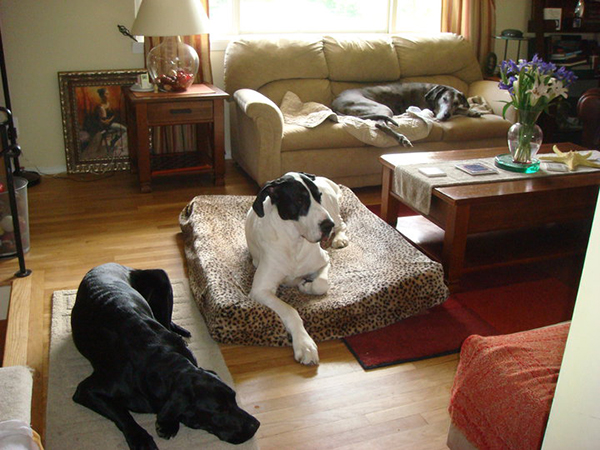
Rescue groups have been formed to save and re-home dogs that are unwanted, lost or abandoned. Amazingly enough, many people turn their Danes over to rescue with the reason “I didn’t know he would grow so big” or “he won’t behave.”
Another reason is that the novelty of a cute puppy wears off when it grows up. Families often purchase puppies to teach the children responsibility. They give the entire responsibility of taking care of the dog to a child. Unfortunately, children are not good care-takers and the dogs is often neglected. The care of a pet must belong to a responsible adult.
When a family gets a new pet, they should do a bit of research to see if that animal will fit with their lifestyle. One common misconception is that dogs train themselves. The problem is that dogs will behave like dogs. They don’t understand that it’s wrong to get into the garbage, steal food from the counter tops or chew on the furniture unless they’re taught that it’s wrong. The young Dane in the photograph above just came into rescue a couple days before this picture was taken. She’s very proud of her work and sees nothing wrong with un-stuffing the sofa. She has since been taught that this is unacceptable behavior.
With any dog, and especially a dog the size of a Dane, it’s also best to spend some time with obedience training. Taking your dog to a local obedience class will not only teach your dog manners, but it will also help socialize your dog so it reacts well when it meets strange dogs and people. Besides, you surely don’t want to walk a 100-plus pound dog that doesn’t know that it’s wrong to drag you down the street. Owners also need to be taught and trained how and what to do and commands should be consistent between family members or the dog will be boss.
Many of these untrained dogs will be chained out in the yard and forgotten. Dogs are very social animals and to deny them access to your family is mentally cruel. They become stressed and depressed and often take up unwanted habits. Dogs tied in the yard can become very territorial and are more likely to bite strangers. These dogs are often euthanized or turned in to shelters. It’s a sad situation. Read the article why dogs should be indoor pets.
Crate training is a valuable tool. Dogs look at their crate in the same way as their wild counterparts view a safe den. A crate can also keep your property safe during training when the dogs are unsupervised. The puppies below are still learning.
